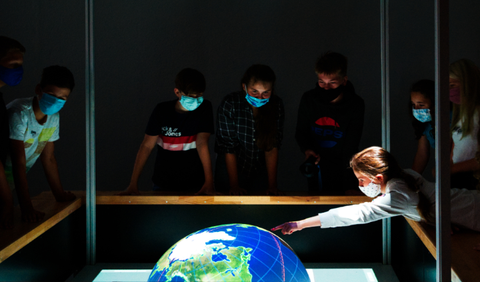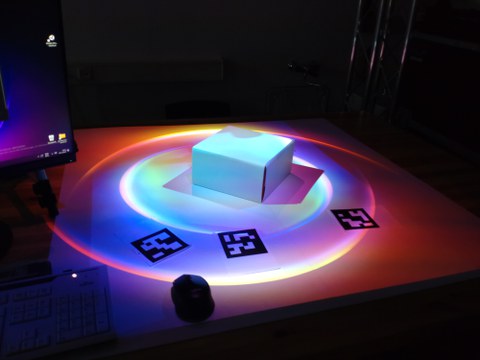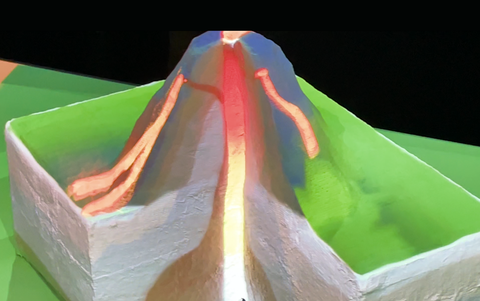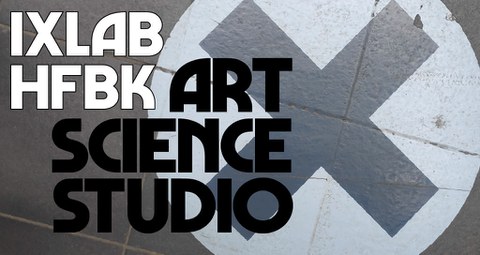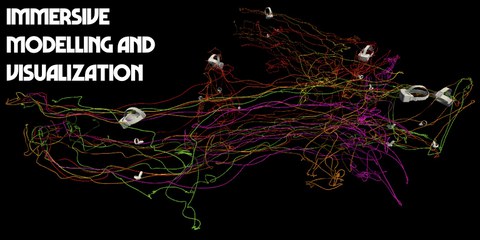[Archive] SoSe23- Seminars, Workshops and Lectures
Summer Semester 2023
- All classes taught in English, unless otherwise specified
- Enrolment for all* classes in OPAL (Enrolment starts on 27.3.2023 0900h) This includes CMS students who would normally use SELMA. (*except for INF-B-490, which uses jExam)
- Summer semester 2023 courses will be on-campus
- For live updates on IXLAB courses and news, subscribe to the matrix room #ixlab:tu-dresden.de
-
Our classes are listed in the Course Catalog as "Gestaltung immersiver Medien" in the Institute Software- und Multimediatechnik: https://wwwdek.inf.tu-dresden.de/mole-web/catalogs/sose23/institute/smt/schedule/de#gim
| Type | Practical Course / Komplexpraktikum (0|0|4) |
|---|---|
| Language | Deutsch, English |
| Lecturers | Dr. Ingmar Franke, Oliver Braun |
| Modules |
CMS-VC-ELV1, CMS-VC-ELV2, INF-B-510, INF-B-520, INF-B-530, INF-B-540, INF-E-4, INF-MA-PR, INF-VERT3, INF-VERT7, INF-VMI-1A, INF-VMI-4A, INF-VMI-6, INF-VMI-8A |
| Assessment | Presentation, report and final project |
| Location | IXLAB Studio - Room E0046 Andreas Pfitzmann Bau, Nöthnitzerstrasse 46 |
| Time | |
| Enrolment | OPAL, if necessary also SELMA or jExam |
The Chair for Immersive Media Design (IXLAB.io) will be focusing on the conception and implementation of mixed reality scenarios. For this purpose, the participants of the course will use an existing installation that allows projection mapping. Unity will be used as the basic software framework for creating interactive scenarios. However, Unreal Engine can also be used. In addition, real objects must be handcrafted onto which the visualisations are automatically projected.
According to the module description, the course consists mainly of self-study. For this purpose, the chair has its own large laboratory and also provides workstations with the necessary computer technology for the participants. In addition, the chair staff will offer a crash course in Unity.
If you would like to participate, please find yourself in this matrix room: https://matrix.to/#/#IX_SS23_ProjectionMapping:tu-dresden.de.
Look under OPAL and sign up: OPAL
| Type | Practical Course / Komplexpraktikum (0|0|4) |
|---|---|
| Language | German / English |
| Lecturers | Jun. Prof. Theda Nilsson (HfBK) & Matthew McGinity |
| Modules |
CMS-VC-ELV1, CMS-VC-ELV2, INF-B-510, INF-B-520, INF-B-530, INF-B-540, INF-E-4, INF-MA-PR, INF-VERT3, INF-VERT7, INF-VMI-1A, INF-VMI-4A, INF-VMI-6, INF-VMI-8A |
| Assessment | Presentations, Documentation and final Project |
| Time | TBD |
| Location | HfBK, Room 228, Güntzstraße. 34, Dresden |
| Enrolment |
OPAL |
A studio/workshop led by Jun. Prof. Theda Nilsson and Julius Eicke with theatre and set design students from Dresden Academy of Fine Arts (HfBK).
Project: Festival of the RARE - Prague Quadrennale 2023
Thema: Genius Loci
Building on the success of our last TU Dresden/HfBK collaboration (see Gesamtkunstwerk), we once again offer the Art/Science Studio. In this class, informatik and theatre students work together to create and present an artistic work.
This year, we have the honour of representing Germany at the 15th edition of the Prague Quadrennial! Students will work together to create and present a work in Prague during the festival. The theme of the festival is "RARE Stories of unique places", and their "genius loci".
The festival opens on June 7th, and then runs over 10 days to June 18th. For this course, students will be expected to work more intensively than usual from the beginning of the summer semester until the festival opens. Classes will take place at HfBK and APB.
Enrolment in the course is limited to 6 informatik students and 6 HfBK students. As such, enrolment for the course is selective, according to experience and skills and the need to create a well-rounded team. If interested, please enrol on the Opal waiting list AND send an email to matthew.mcginity@tu-dresden.de stating your current degree and year, and any extra information you feel may help your case, (such as CV or transcripts).
| Type | Pro-/Haupt- Seminar (0|2|0) |
|---|---|
| Language | English |
| Lecturer | Zhongyuan Yu |
| Modules |
Pro: INF-B-610, INF-D-520 |
| Assessment | Presentation and written report |
| Date&Place | |
| Enrolment | OPAL |
As virtual and augmented reality become more accessible, the use of such technologies for the immersive 3D visualisation and manipulation of data and structures has become increasing viable. What are the benefits and challenges of visualising and manipulating abstract, virtual or remote datasets in an immersive manner?
In this seminar, participants will study and evaluate existing applications and algorithms in the field of immersive modeling and visualization. Students will examine the kinds of applications and datasets that may benefit from immersive visualisation, and study the technical challenges and solutions involved in building such applications. This includes immersive mesh processing and modelling, point cloud visualisation, labelling, segmentation and manipulation, graph and trajectory data visualisation, voxel and volumetric video visualisation, environmental and geospatial visualisation.
The seminar combines both theory and hands-on practical experience using virtual reality. Students will research and review relevant academic texts, and then, using headsets such as the Oculus Quest, Varjo XR-3, Valve Index and Hololens, systematically evaluate available commercial and open-source visualisation solutions. A final presentation, as well as a technical report, is expected as outcome by the end of the semester.
| Type | Komplexpraktikum |
|---|---|
| Language | English & German |
| Lecturer | Dr. Ingmar Franke, Oliver Braun |
| Modules | INF-B-490 |
| Assessment | Practical project, presentation, report |
| Date&Place | Matrix |
| Enrolment | OPAL and jExam |
The related introductory event will take place on 5 April 2023. You can find the slides of the introductory event here (PDF slides).
The Chair for Immersive Media Design (IXLAB.io) will be focusing on the conception and implementation of mixed reality scenarios. For this purpose, the participants of the course will use an existing installation that allows projection mapping. Unity will be used as the basic software framework for creating interactive scenarios. However, Unreal Engine can also be used. In addition, real objects must be handcrafted onto which the visualisations are automatically projected.
According to the module description, the course consists mainly of self-study. For this purpose, the chair has its own large laboratory and also provides workstations with the necessary computer technology for the participants. In addition, the chair staff will offer a crash course in Unity.
If you would like to participate, please find yourself in this matrix room: https://matrix.to/#/#IX_SS23_ProjectionMapping:tu-dresden.de.
Look under OPAL and sign up: OPAL
The course is organized jointly by chairs of the Institute SMT:
+ Junior Professorship for Immersive Media (IXLAB.io)
+ Professorship Computer Graphics and Visualization
+ Professorship Multimedia Technology
| Type | Research Project (0|0|8 or 12) |
|---|---|
| Language | English |
| Modules | Bachelor and Master Theses, Gross Beleg and individual and team research projects INF-PM-FPA, INF-PM-FPG, CMS-PROJ, CMS-VC-TEA |
| Assessment | Presentations, Documentation and final Project |
| Date&Place | ongoing |
| Enrolment |
IXLAB is offering a range of individual and group Research Projects in the field of immersive media. Topics include theoretical and perceptual factors, technical challenges, design and interaction issues and novel applications of different manifestations of virtual and augmented reality. Application fields include archaeology, architecture, data visualisation, geospatial science, physiotherapy or psychotherapy, museums and libraries, music and film production, journalism or education and training.
Projects are available for all levels: Bachelor and Master Theses, Gross Beleg and individual and team research projects INF-PM-FPA, INF-PM-FPG, CMS-PROJ, CMS-VC-TEA
See here for example Research Projects and this Guide for instructions on how to apply for a project.
Timetable (to be finalised)
| Mon | Tue | Wed | Thu | Fri | ||
|---|---|---|---|---|---|---|
| 1. DS | 07:30 - 09:00 | |||||
| 2. DS | 09:20 - 10:50 | |||||
| 3. DS | 11:10 - 12:40 | |||||
| 4. DS | 13:00 - 14:30 | KP Immersive Visualisation und Medieninformatik-Projekt (weiter abzustimmen) | KP Immersive Visualisation und Medieninformatik-Projekt (weiter abzustimmen) | |||
| 5. DS | 14:50 - 16:20 | KP Immersive Visualisation und Medieninformatik-Projekt (weiter abzustimmen) | KP Immersive Visualisation und Medieninformatik-Projekt (weiter abzustimmen) | |||
| 6. DS | 16:40 - 18:10 | KP Immersive Visualisation und Medieninformatik-Projekt (weiter abzustimmen) | KP Immersive Visualisation und Medieninformatik-Projekt (weiter abzustimmen) |
KP - Komplexpraktikum
Modules
| Bachelor | Master & Diplom | ||||
|---|---|---|---|---|---|
| SWS | Informatik & Medien-informatik | Medien-informatik | Informatik | CMS | |
| Komplexpraktikum Art Science Studio | 0|0|4 | B-510 B-520 B-530 B-540 |
VMI-1A VMI-4A VMI-6 VMI-8A E-4 |
VERT-3 VERT-7 MA-PR |
VC-ELV1 VC-ELV2 |
|
Pro-/Hauptseminar Immersive Modelling & Visualisation |
0|2|0 | B-610 | AQUA | AQUA D-520|-940 |
CMS-SEM |
| Komplexpraktikum Experiments in Immersive Media | 0|0|4 | B-510 B-520 B-530 B-540 |
VMI-1A VMI-4A VMI-6 VMI-8A E-4 |
VERT-3 VERT-7 MA-PR |
VC-ELV1 VC-ELV2 |
| Komplexpraktikum Immersive Visualisation | 0|0|4 | B-510 B-520 B-530 B-540 |
VMI-1A VMI-4A VMI-6 VMI-8A E-4 |
VERT-3 VERT-7 MA-PR |
VC-ELV1 VC-ELV2 |
| Research Project Immersive Media |
0|0|8 | PM-FPA PM-FPG INF-D-960 |
CMS-VC-TEA | ||
| CMS Research Project Immersive Visualisation |
0|0|12 | CMS-PROJ | |||
| Komplexpraktikum Medieninformatik Projekt – INF-B-490 | 0|0|3 | B-490 | |||

